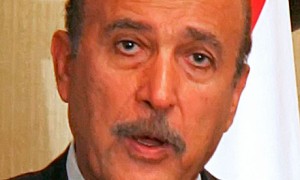 Omar Suleiman, the once-powerful head of Egypt’s intelligence service who tried and failed to run for president, died in an American hospital early on Thursday, according to the state-owned news agency MENA.
Omar Suleiman, the once-powerful head of Egypt’s intelligence service who tried and failed to run for president, died in an American hospital early on Thursday, according to the state-owned news agency MENA.
There had been no public reports that Mr. Suleiman was ailing or that he had gone to the United States for medical care, so the news of his death came as a surprise.
Reuters said that Mr. Suleiman died suddenly “while he was undergoing medical examination,” while Al Ahram, the state-owned newspaper, said he died at a hospital in Cleveland. There was no indication of the cause of death.
Mr. Suleiman, 76, was one of the original candidates to replace ousted Hosni Mubarak as president after his ouster, but an Egyptian court disqualified him over irregularities in his nomination.
For 18 years, Mr. Suleiman headed the powerful General Intelligence Directorate, Egypt’s domestic and international spy agency, generally called the mukhabarat, but he is likely to be best remembered for his role in the waning days of the Mubarak government. In the final two weeks, Mr. Mubarak appointed him to the long-vacant post of vice president, and Mr. Suleiman made the announcement of the president’s resignation on Feb. 11.
Given widespread public opposition among Egypt’s revolutionaries to any former Mubarak figure, however, Mr. Suleiman announced that he too would resign and that power would be transferred to the military, while a successor was appointed head of the mukhabarat.
He was the first head of the powerful intelligence service whose identity was publicly known and he played a key role in Egyptian diplomatic efforts to foster reconciliation between Palestinians from Hamas and Fatah, although releases of WikiLeaks documents showed that he worked with the Israelis to try to deny Hamas its electoral victory in Gaza.
“I think a lot of secrets will die with him,” said Nabil Fahmy, the former Egyptian ambassador to the United States. “He had a unique ability of being in a very sensitive, often controversial, position as head of intelligence but at the same time preserving the respect of people toward him. He was a professional.”
Mr. Suleiman was also widely accused of involvement in the torture of dissidents, and was considered a staunch opponent of the Muslim Brotherhood as well as an architect of the long ban on that organization’s participation in political life. He was also deeply involved in the C.I.A.’s rendition program, in which terrorism suspects were sent to countries where they could be tortured, according to a report in The New Yorker and a number of books.
His public speeches during the Tahrir Square protests, denouncing protesters as agents of foreign governments, eroded public support for him.
NY Times

Leave a Reply
You must be logged in to post a comment.